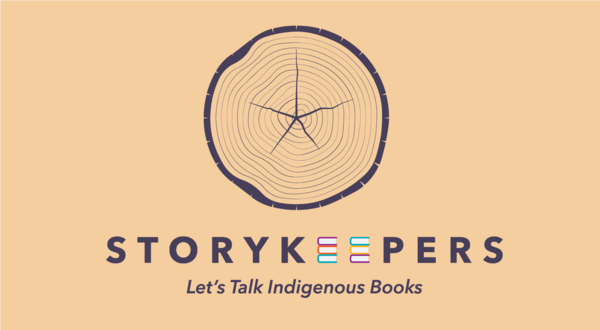Podcasting about Indigenous books
By Waubgeshig Rice
The world of podcasting is already saturated. Even book podcasts are abundant, with various shows focusing on everything from reviews to an author’s body of work to genre. Although it seems a new podcast is born every minute, that doesn’t mean there isn’t room for more discussions and perspectives. I’ve always been interested in podcasting, but I was never really sure I wanted to put my voice out there just for the sake of it. There are many more talented and smarter people than me who can create compelling general commentary about the world we live in. But then a very specific opportunity came about, and I was on board.
About a year ago, a friend of mine from Ottawa named Jennifer David asked if I wanted to start a podcast with her. She had a very particular idea in mind: a monthly show much like a book club focused on Indigenous literature. She suggested that each month we’d pick a book written by an Indigenous author to discuss, and we’d invite a guest host to join us. The idea was to share conversations about the books we love more widely. Many Indigenous readers are already having book chats regularly, so we just wanted to widen the circle in our own way.
Jennifer and I have similar professional and cultural backgrounds and we both love books, so it seemed like the conversations and the teamwork would come naturally. She has roots in Chapleau Cree First Nation in northern Ontario, and I’m from the Anishinaabe community of Wasauksing First Nation on Georgian Bay. We’ve both worked in broadcasting and have written books. So most of the heavy lifting would involve planning out the show, and the books and authors we wanted to feature.
We developed the idea over the summer, and by the fall, we settled on a name: the Storykeepers Podcast (storykeeperspodcast.ca). We created a list of dozens of classic and recent works of fiction, non-fiction, poetry, and plays. Then we came up with another list of potential guest hosts: Indigenous authors, journalists, filmmakers, podcasters, and more. The plan was that we’d record from our respective homes in Ottawa and Sudbury, and bring in our guests via online platforms like Zoom. In the pandemic era of remote production of almost everything, the initiative seemed totally viable.
We planned to fund the whole project out of our own pockets, but then we decided to inquire with the Ontario Arts Council about potential funding. We were pointed to the Indigenous Arts Program, so we applied. This past winter, we learned we were successful in receiving a grant to cover some equipment and operating costs, and Storykeepers was destined to becoming a reality. We mapped out a recording schedule, lined up our guests, and got reading.
Your CanLit News
Subscribe to Open Book’s newsletter to get local book events, literary content, writing tips, and more in your inbox
Our first episode launched in March, featuring Daniel Heath Justice’s crucial book Why Indigenous Literatures Matter. Following that, we invited poet Gregory Scofield to join us to discuss Maria Campbell’s classic memoir Halfbreed. The next month, we discussed Eden Robinsons Return of the Trickster with Cherie Dimaline. Our June episode is about Richard Wagamese’s Medicine Walk, with Duncan McCue weighing in. The conversations have been compelling, enlightening, and fun. We’ve been humbled and honoured by the response, and we’re very grateful for this opportunity.
It’s obviously not an original idea, though, and we acknowledge the great Indigenous podcasts and online discussions about books that are already out there inspiring us and many others. The Book Women Podcast (https://bookwomenpodcast.ca), created by three Métis women with roots on the Prairies, has been going strong for three seasons now. Ambe (http://daanis.ca/ambe/) is a monthly online panel discussion about Indigenous books. CBC Radio’s Unreserved (https://www.cbc.ca/radio/unreserved) regularly features book discussions that make it online as podcasts. And on YouTube, avid readers like the Native Lady Book Warrior (https://www.youtube.com/channel/UCL_z3LHTJ5sj-oiYAfR5bQA) are steadily shining a spotlight on Indigenous literature.
So there’s lots of room in the widening circle for discussions via podcast about literature, especially books by Indigenous authors. It’s exciting to jump into this world as an author. In some ways, Storykeepers is our homage to the oral storytelling traditions of our cultures. As storytellers, Indigenous authors bolster the stories and cultures of their people by writing down their realities, experiences, and histories. They weave in and out of the spoken realm, and we’re excited to be a part of that.
The views expressed by Open Book columnists are those held by the authors and do not necessarily reflect the views of Open Book.
Waubgeshig Rice is an author and journalist from Wasauksing First Nation on Georgian Bay. He has written three fiction titles, and his short stories and essays have been published in numerous anthologies. His most recent novel, Moon of the Crusted Snow, was published in 2018 and became a national bestseller. He graduated from Ryerson University’s journalism program in 2002, and spent the bulk of his journalism career at CBC, most recently as host of Up North, the afternoon radio program for northern Ontario. He lives in Sudbury, Ontario with his wife and two sons.




